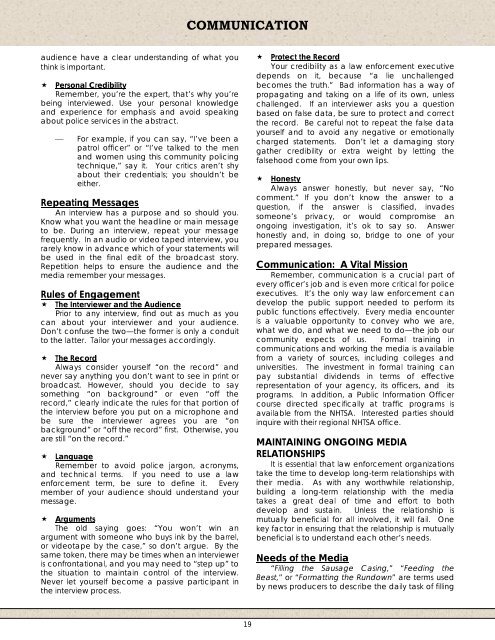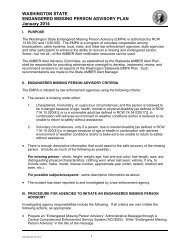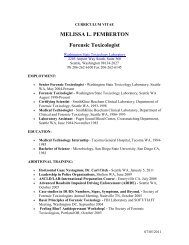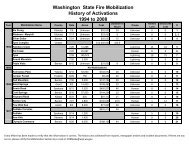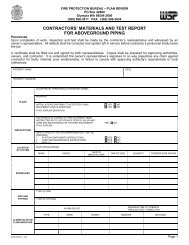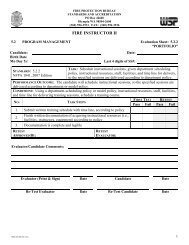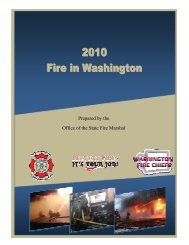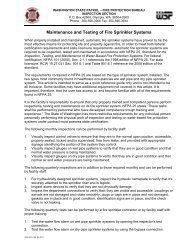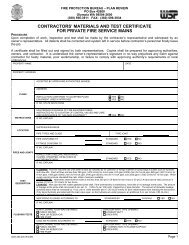Impaired Driving Subcommittee Impaired Driving Guidebook - NHTSA
Impaired Driving Subcommittee Impaired Driving Guidebook - NHTSA
Impaired Driving Subcommittee Impaired Driving Guidebook - NHTSA
You also want an ePaper? Increase the reach of your titles
YUMPU automatically turns print PDFs into web optimized ePapers that Google loves.
COMMUNICATIONaudience have a clear understanding of what youthink is important. Personal CredibilityRemember, you’re the expert, that’s why you’rebeing interviewed. Use your personal knowledgeand experience for emphasis and avoid speakingabout police services in the abstract.⎯For example, if you can say, “I’ve been apatrol officer” or “I’ve talked to the menand women using this community policingtechnique,” say it. Your critics aren’t shyabout their credentials; you shouldn’t beeither.Repeating MessagesAn interview has a purpose and so should you.Know what you want the headline or main messageto be. During an interview, repeat your messagefrequently. In an audio or video taped interview, yourarely know in advance which of your statements willbe used in the final edit of the broadcast story.Repetition helps to ensure the audience and themedia remember your messages.Rules of Engagement The Interviewer and the AudiencePrior to any interview, find out as much as youcan about your interviewer and your audience.Don’t confuse the two—the former is only a conduitto the latter. Tailor your messages accordingly. The RecordAlways consider yourself “on the record” andnever say anything you don’t want to see in print orbroadcast. However, should you decide to saysomething “on background” or even “off therecord,” clearly indicate the rules for that portion ofthe interview before you put on a microphone andbe sure the interviewer agrees you are “onbackground” or “off the record” first. Otherwise, youare still “on the record.” LanguageRemember to avoid police jargon, acronyms,and technical terms. If you need to use a lawenforcement term, be sure to define it. Everymember of your audience should understand yourmessage. ArgumentsThe old saying goes: “You won’t win anargument with someone who buys ink by the barrel,or videotape by the case,” so don’t argue. By thesame token, there may be times when an intervieweris confrontational, and you may need to “step up” tothe situation to maintain control of the interview.Never let yourself become a passive participant inthe interview process. Protect the RecordYour credibility as a law enforcement executivedepends on it, because “a lie unchallengedbecomes the truth.” Bad information has a way ofpropagating and taking on a life of its own, unlesschallenged. If an interviewer asks you a questionbased on false data, be sure to protect and correctthe record. Be careful not to repeat the false datayourself and to avoid any negative or emotionallycharged statements. Don’t let a damaging storygather credibility or extra weight by letting thefalsehood come from your own lips. HonestyAlways answer honestly, but never say, “Nocomment.” If you don’t know the answer to aquestion, if the answer is classified, invadessomeone’s privacy, or would compromise anongoing investigation, it’s ok to say so. Answerhonestly and, in doing so, bridge to one of yourprepared messages.Communication: A Vital MissionRemember, communication is a crucial part ofevery officer’s job and is even more critical for policeexecutives. It’s the only way law enforcement candevelop the public support needed to perform itspublic functions effectively. Every media encounteris a valuable opportunity to convey who we are,what we do, and what we need to do—the job ourcommunity expects of us. Formal training incommunications and working the media is availablefrom a variety of sources, including colleges anduniversities. The investment in formal training canpay substantial dividends in terms of effectiverepresentation of your agency, its officers, and itsprograms. In addition, a Public Information Officercourse directed specifically at traffic programs isavailable from the <strong>NHTSA</strong>. Interested parties shouldinquire with their regional <strong>NHTSA</strong> office.MAINTAINING ONGOING MEDIARELATIONSHIPSIt is essential that law enforcement organizationstake the time to develop long-term relationships withtheir media. As with any worthwhile relationship,building a long-term relationship with the mediatakes a great deal of time and effort to bothdevelop and sustain. Unless the relationship ismutually beneficial for all involved, it will fail. Onekey factor in ensuring that the relationship is mutuallybeneficial is to understand each other’s needs.Needs of the Media“Filling the Sausage Casing,” “Feeding theBeast,” or “Formatting the Rundown” are terms usedby news producers to describe the daily task of filling19


